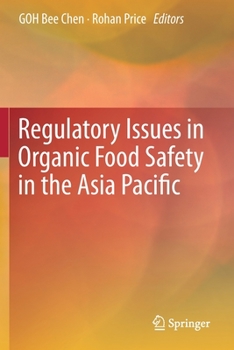Regulatory Issues in Organic Food Safety in the Asia Pacific
Select Format
Select Condition 
Book Overview
CHAPTER SYNOPSES Chapter 1 Goh, Bee Chen and Price, Rohan Introduction: Organic Food Safety and Regulatory Framework in the Asia Pacific PART I INTERNATIONAL PERSPECTIVES ON ORGANICS REGULATORY FRAMEWORK Chapter 2 Leifert, Carlo, Willson, Adam and Paynter, Greg HACCP-based quality assurance systems for the organic food sector; the need to cover food quality, safety and security The price premium achieved by organic foods is based on consumer perceptions that organic crop and livestock production protocols deliver significant environmental, biodiversity, ethical and food quality, and security gains. Auditing based organic certification and HACCP-based food safety assurance systems that are currently used for quality assurance in primary food production focus primarily on ensuring (a) that 4 farmers do not use prohibited inputs such as synthetic chemical fertilisers, pesticides, hormones, and food additives that are of concern to consumers, (b) the absence of potentially harmful microbial, chemical and physical hazards and (c) traceability of foods throughout the supply chain. In contrast, quality assurance systems for environmental, biodiversity and in particular nutritional quality and food security gains associated with organic production systems are relatively poorly developed. Also, while animal health and welfare is a major objective of organic standards/certification schemes, current standards/auditing systems are thought to be inefficient with respect to ensuring (a) the ethical treatment of farm workers and (b) "fair trade"/ethical relationships between supply chain actors. This chapter will therefore review the results of recent meta-analyses of the agronomic and supply chain factors responsible for (a) differences in nutritional quality between organic and conventional foods, and (b) positive environmental, biodiversity and food security impacts of organic farming practices. Approaches/strategies which could be taken to expand organic certification schemes to cover nutritional, environmental, ethical and food security-related "quality" parameters are discussed. Chapter 3 Shen, Ying Chinese Organic Food Law and Its Impact on Climate Change China is among the world's largest producers in organics and its organic agriculture has been boosting since the turn of the Millennium with the rapid development of both domestic and international production and trade in organic food. To instil transparency and trust among stakeholders, the Chinese government has issued a series of new regulations relating to food safety and organic certification. Organic agriculture ensured by these regulations is not only affected by climate change but also contributes to it, both adapting to changes and offering options for mitigation (i.e. reducing greenhouse gas emissions and storing carbon). This chapter aims to provide an overview of Chinese organic food law and investigate its impact on climate change. Through investigating stakeholders involved in and regulations relating to organics, challenges to the enforcement of food safety law as well as organic certification issues are identified and analysed. Particularly, the impact of these regulations on climate change mitigation and adaptation is discussed as an outlook on the development of organic agriculture in China. Chapter 4 Goh, Bee Chen COOL Organic Trade - Organic Food Certification Influencing Asian Consumerism, with a special reference to China and Thailand Consumers are interested in buying organic food products from countries where there is a reputation for organic quality and standard through the certification process. Countries like Australia, New Zealand and Canada have been well-known generally for high-quality organic food production and distribution through maintaining stringe
Format:Paperback
Language:English
ISBN:9811535825
ISBN13:9789811535826
Release Date:June 2021
Publisher:Springer
Length:277 Pages
Weight:0.91 lbs.
Dimensions:0.6" x 6.1" x 9.2"
Customer Reviews
0 rating





